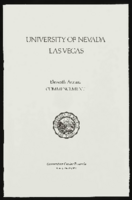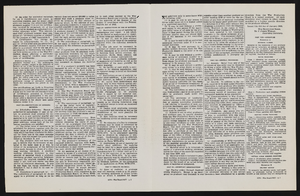Search the Special Collections and Archives Portal
Search Results

Transcript of interview with Eva Garcia Mendoza by Elsa Lopez and Barbara Tabach, September 25, 2018
Date
Archival Collection
Description
On the corner of 7th street and Clark, and beside the tennis courts of Las Vegas Academy, stands the law office of attorney Eva Garcia Mendoza. Eva has worked in her office since 1982, and in this time she has helped the Las Vegas community work through civil and immigration cases besides aiding in a myriad of other ways. Eva Garcia Mendoza was born in 1950, in the town of McAllen, TX-an environment that perpetuated hatred of Mexican Americans. Eva recalls the racism she endured; for instance, being spanked if she spoke Spanish in school, and her family facing job discrimination because of her skin color or her last name. Being an ethnic and financial minority was difficult, and Eva remembers nights as a child when she would cry herself to sleep. Eva showed resilience in the face of adversity as she states, “you rise to the level of your teachers’ expectations.” With the encouragement of her band professor, Dr. L.M Snavely, she began higher education at Pan American College. She moved to Las Vegas in 1971 and began to work before being accepted at UNLV to study Spanish literature. She graduated in the class of 1973. In 1975, Eva applied to become a court interpreter, a decision that would drastically change the trajectory of her career. She earned the coveted position and began to work beside Judge John Mendoza who was the first Latino elected to public office in the state of Nevada. Several years later John and Eva would wed. Judge Mendoza passed away in 2011. Eva talks about how extraordinary his legacy is-from his professional achievements to a story about his v football days and the 1944 Dream Team, this true story even piqued the interest of Hollywood writers. Through her work, Eva began to notice how she was more than qualified to become a lawyer herself, so she applied and gained a full ride scholarship to the Law School of San Diego University. Eva describes the struggles of attending school in San Diego while her spouse and children were home in Las Vegas. Despite the financial difficulties, being one of few minority students, and becoming pregnant her second year, Eva was able to finish her remaining university credits by returning to Las Vegas and working with Judge Mendoza. Together, they started the Latin Bar Association. Eva began her own practice in 1981 and would later partner with Luther Snavely, who was the son of her band teacher that helped her to attend college so many years back. Today, Eva has a new partner at her office and hired her son to work as a secretary. Eva also tells of the office’s mysterious history, of which includes a ghostly figure many clients claimed to have seen in the reception room. Eva recounts many of her professional achievements, such as petitioning to start the American Immigration Lawyers Association, Nevada Chapter, representing celebrities, winning the unwinnable cases such as against the Nevada Test Site. Eva talks about current events, such as today’s immigration laws, the discriminatory practices of revoking birth certificates from those born in Brownsville, TX., and about the importance of the #MeToo movement. Eva and her family have a great fondness for Las Vegas. The support for the Latinx community in Las Vegas greatly contrasts that which she experienced as a child in southern Texas. She describes wanting to take her children and grandchildren to visit her old home in McAllen, TX where her family grew up on the “wrong side of the tracks.”
Text

Daniel A. Moore interview, March 3, 1979: transcript
Date
Archival Collection
Description
On March 3, 1979, Norwood Germany Jr. interviewed Daniel A. Moore (b. 1939 in Fort Worth, Texas) about his life in Las Vegas, Nevada. Moore begins by speaking about his move to Las Vegas from Utah at a young age, his education and his work in construction and at the Las Vegas McCarran Airport. Moreover, Moore speaks about his involvement with church and his recreational hobbies such as bowling. Moore also spends time speaking about the African American population in Las Vegas, the jobs available to them, racial tensions in his young adulthood versus his children’s experiences, and the segregation of black communities into the Las Vegas Westside. Lastly, he talks about the city’s growth, tourism and the economy, the development of different shopping centers and malls, and the city’s law enforcement.
Text

Transcript of interview with Harriett Thornton Hicks by Claytee D. White, October 28, 2009
Date
Archival Collection
Description
Harriett Thornton Hicks was born June 8, 1913,in Parowan, Utah; the thirteenth child of 14. She tells of her pioneer family who dwelled in two log cabins—one for cooking and one for sleeping. In 1931, she moved to Las Vegas to join two older sisters who had relocated here. She was picked up at the train by young Charles Hicks, who was a friend of her sisters. Charles had a car and offered to provide transportation. Within three years, the two were married. She quit her drug store job to raise a family and he worked for the railroad, the only business at the time in Las Vegas. At the age of 96, Harriett recalls a range of community milestones, such as the Boulder Dam, the news of Pearl Harbor bombing, Fremont Street, the Biltmore Hotel, and how to live in a city with mob influences.
Text

University of Nevada, Las Vegas (UNLV) 11th commencement program
Date
Archival Collection
Description
Commencement program from University of Nevada, Las Vegas Commencement Programs and Graduation Lists (UA-00115).
Text

Kaity Webber oral history interview: transcript
Date
Archival Collection
Description
Oral history interview with Kaity Webber conducted by Barbara Tabach on November 16, 2017 for the Remembering 1 October Oral History Project. Kaity Webber describes moving to Las Vegas, Nevada and earning her degree in psychology from the University of Nevada, Las Vegas. Webber discusses the excitement she had going to the Route 91 Harvest festival with a friend on the weekend of the October 1, 2017 Las Vegas shooting. She talks about her experiences from that night, including how she found shelter in the Thomas & Mack Center with countless others, as well as her process of healing from the traumatic event.
Text

William O'Neill McCurdy Sr. oral history interview: transcript
Date
Archival Collection
Description
Oral history interview with William O'Neill McCurdy by Claytee D. White on January 26, 2022 for the African Americans in Las Vegas: A Collaborative Oral History Project. In this interview, McCurdy describes his childhood growing up in Las Vegas, Nevada, graduating from Valley High School, and attending Western Nevada College in Carson City, Nevada. He worked for many years for the Parks and Recreation department, and has served on numerous boards including the Citizens' Advisory for Regional Transportation (RTC), Habitat for Humanity Board of Director, Mineral County Economic Advisory Committee, City of Las Vegas Community Block Grant Advisory Board, and Southern Nevada Regional Housing Authority Commission. Currently, McCurdy owns McCurdy & McCurdy Media Group, a political consulting and advertising firm which has assisted numerous political candidates in fulfilling their dreams of helping to govern Las Vegas, Clark County, the State of Nevada, and even in the United States Congress.
Text

Lily Teo oral history interview: transcript
Date
Archival Collection
Description
Oral history interview with Lily Teo conducted by Stefani Evans on February 7, 2022 for Reflections: The Las Vegas Asian American and Pacific Islander Oral History Project. Lily Teo discusses her upbringing in Singapore, her education, her religious beliefs, and converting from Buddhism to Catholicism. She talks about her husband, her early married years, and what life was like as a young mother of three children. Teo shares how she started a catering business to feed construction workers and was responsible for shopping for ingredients, preparing all meals and tea, and cooking the food on site in her temporary kitchen. She talks about her children, the faiths they practice and languages they speak including English, Malay, and Mandarin, and the customs and traditions they practice, such as celebrating Lunar New Year and other holidays. Lily's daughter, Stella, sits in on the interview and expands on her mother's recollections.
Text

Joy Rineer oral history interview: transcript
Date
Archival Collection
Description
Oral history interview with Joy Rineer conducted by Claytee D. White on December 07, 2017 for the Remembering 1 October Oral History Project. In this interview, Rineer discusses her upbringing in Las Vegas, Nevada. She describes her career as an architect, designing the Resilience Center for those affected by the 1 October shooting, and the city’s response to the shooting. Later, Rineer describes helping the grief-stricken city through architecture, establishing the Leadership Las Vegas program, and organizing blood drives. Lastly, Rineer discusses the changes in Las Vegas after the tragedy.
Text

Joseph Ostunio oral history interview: transcript
Date
Archival Collection
Description
Oral history interview with Joseph Ostunio conducted by Claytee D. White on December 20, 2017 for the Remembering 1 October Oral History Project. In this interview, Joseph Ostunio discusses his early childhood in Las Vegas, Nevada and how he grew to love country music. He talks about the Route 91 Harvest music festival, which he attended with his friend in 2017. He describes the events of that weekend and the shooting on that Sunday, October 1, 2017, during which his friend was shot. Ostunio ends the interview with his feelings regarding Las Vegas and what he has learned about himself from this experience.
Text

